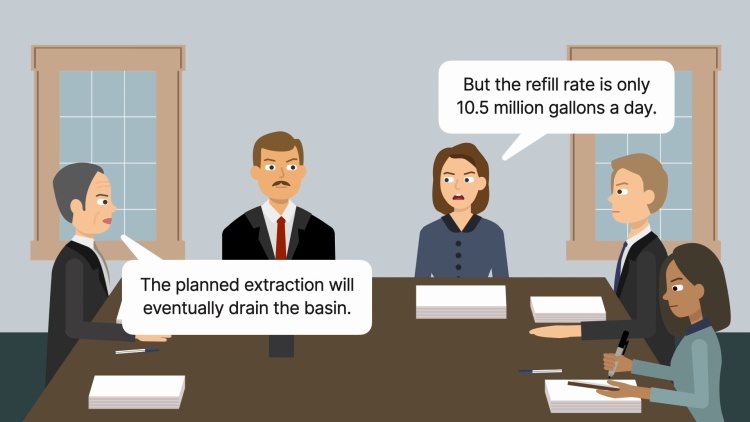Higday v. Nickolaus
Missouri Court of Appeals
469 S.W.2d 859 (1971)
- Written by Melanie Moultry, JD
Facts
Several landowners (plaintiffs) owned farmland overlying a water basin. The basin supplied water for the landowners’ agricultural and personal uses. The City of Columbia (the city) (defendant) had a water shortage. The city acquired land overlying the water basin, for the purpose of extracting and transporting 11.5 million gallons of water daily for sale to the city’s residents. The basin’s daily recharge rate was 10.5 million gallons. The landowners sued the city seeking: (1) a judicial declaration that the city had no right to extract the water for any use unrelated to the beneficial ownership or enjoyment of the land, including sale away from the land, and (2) an injunction preventing the city from extracting the water. The landowners claimed that the city’s intended consumption would lower the basin’s water table and harm the landowners’ ability to use the groundwater. However, the city claimed that the English common law rule of absolute ownership of percolating waters gave it the right to withdraw an unlimited amount of groundwater, even if the result was to drain all groundwater from neighboring lands. The city moved to dismiss the case, and the trial court granted the motion. The landowners appealed to the Kansas City Court of Appeals.
Rule of Law
Issue
Holding and Reasoning (Shangler, C.J.)
What to do next…
Here's why 907,000 law students have relied on our case briefs:
- Written by law professors and practitioners, not other law students. 47,100 briefs, keyed to 996 casebooks. Top-notch customer support.
- The right amount of information, includes the facts, issues, rule of law, holding and reasoning, and any concurrences and dissents.
- Access in your classes, works on your mobile and tablet. Massive library of related video lessons and high quality multiple-choice questions.
- Easy to use, uniform format for every case brief. Written in plain English, not in legalese. Our briefs summarize and simplify; they don’t just repeat the court’s language.





